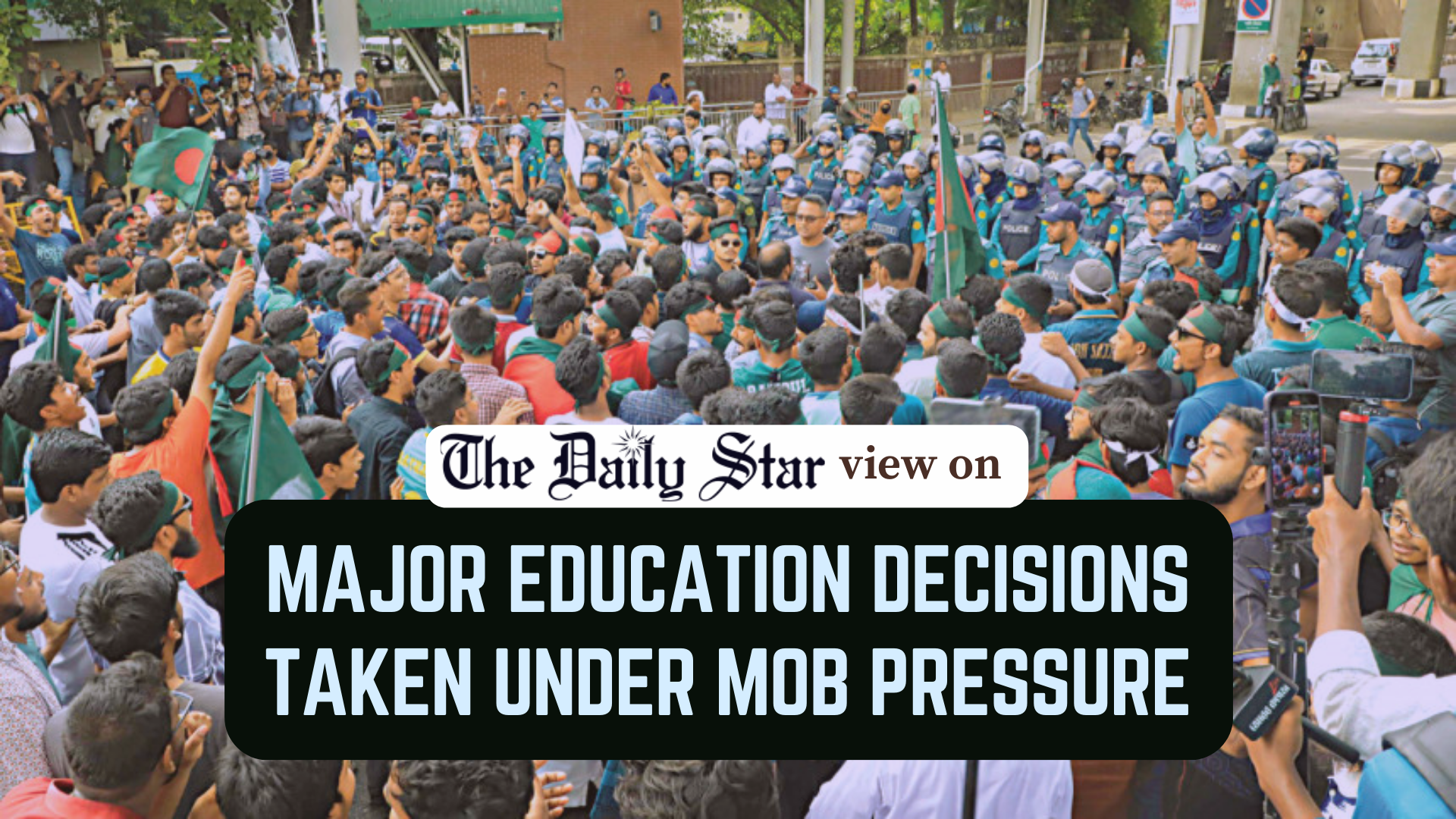Reflections on Aynaghar and the politics of manipulation in the education sector

The experience of watching Aynaghar and reading the United Nations report on the July uprising was profoundly unsettling. It evoked a visceral reaction—a mix of dread and disgust—at the extent to which power-hungry regimes can go to silence dissent. The chilling accounts of law enforcement agencies being directed to indiscriminately kill, disappear individuals, and carry out unspeakable atrocities purely to preserve the grip on power paint a dark picture of governance devoid of morality. For anyone who has seen even a glimpse of the brutalities captured in Aynaghar, the sheer inhumanity is impossible to ignore.
At the heart of this reign of terror was a simple yet insidious narrative: "Without the Awami League, the BNP-Jamaat alliance will seize power and lead the nation towards extremism." This narrative, repeated often and amplified strategically, became the justification for every injustice. To sustain it, a network of teachers, journalists, and influencers was cultivated—a paid group that reaped personal benefits in exchange for perpetuating this myth. Through privileges and rewards, this group became complicit in turning a blind eye to, and often supporting, systemic abuse of power.
While the fear that the nation might steer towards extremism under a far-right regime may not have been entirely unfounded, the Awami League's actions over the past 14 years revealed a calculated effort to create conditions that would fulfil this prophecy should the regime fall. In essence, the seeds of chaos were deliberately planted, ensuring that the collapse of the government would lead to a crisis, which in turn would create an opportunity for the despot to return. Nowhere was this more evident than in the education sector.
The education ministry, under Nurul Islam Nahid and later Dr Dipu Moni, became the breeding ground for this strategy. Dipu Moni and her associate Barrister Nowfel took a deteriorating system and turned it into a full-blown catastrophe. Consider the appointments of vice-chancellors and pro-vice-chancellors in public universities. Over the past 14 years, these appointments often prioritised political loyalty over merit, leading to academic mediocrity and administrative inefficiency. Education budget allocations stagnated or declined, revealing a lack of genuine commitment to progress. The curriculum underwent frequent and often absurd changes, with theatrical projects that delivered little to improve education quality.
All these were part of a broader plan to create a generation of poorly educated and miseducated citizens who could be easily controlled and manipulated. This strategy served a dual purpose—an uneducated or misinformed population more susceptible to propaganda was created and institutions were deliberately neglected to ensure succeeding governments inherited chaos, to reinforce the narrative that no alternative to the Awami League could govern effectively.
During this period, pro-Awami League teachers, journalists, and influencers, while fully aware of this scheme, chose personal gain over national interest, indulging in corruption, amassing wealth, building luxurious duplex homes, and transferring money abroad to secure properties. The craze for overseas real estate and extravagant lifestyles among this group peaked during these years.
The educated elite, who should have been the custodians of progress and accountability, became instruments of a regime bent on self-preservation. Their actions were very damaging; their complicity allowed the system to rot from within, leaving the nation vulnerable to both internal and external threats.
It is heartbreaking to witness a country with immense potential reduced to such disarray. Education, which should have been the cornerstone of progress and the foundation of a prosperous society, was weaponised for political manipulation. The consequences of this neglect are far-reaching. A generation has been deprived of quality education, institutions have been eroded, and the nation's future hangs precariously in the balance.
The result is a nation at the mercy of opportunists, where hope is increasingly elusive. As despair deepens, the dream of a functional, just, and progressive Bangladesh seems like an illusion. The question remains: how can we rebuild trust, restore integrity, and chart a path towards genuine progress? The answers lie not in empty narratives or political theatrics but in bold, visionary leadership and a collective commitment to prioritise the welfare of the people over the interests of the few. Until then, the shadow of Aynaghar will continue to haunt us, a stark reminder of what happens when power is pursued at the expense of a nation's soul.
Dr Kamrul Hassan Mamun is professor in the Department of Physics at Dhaka University. He can be reached at khassan@du.ac.bd.
Views expressed in this article are the author's own.
Follow The Daily Star Opinion on Facebook for the latest opinions, commentaries and analyses by experts and professionals. To contribute your article or letter to The Daily Star Opinion, see our guidelines for submission.




 For all latest news, follow The Daily Star's Google News channel.
For all latest news, follow The Daily Star's Google News channel. 

Comments